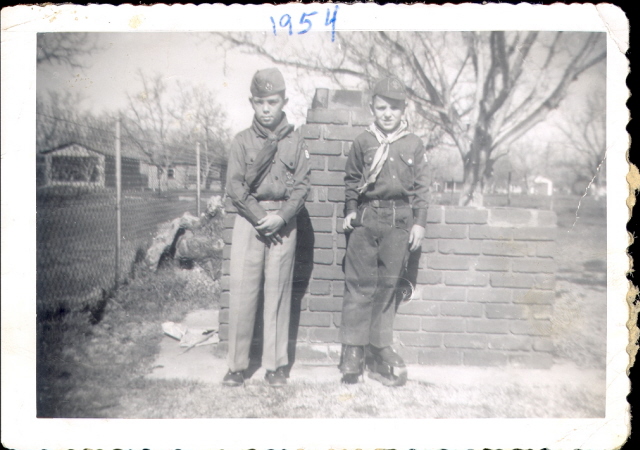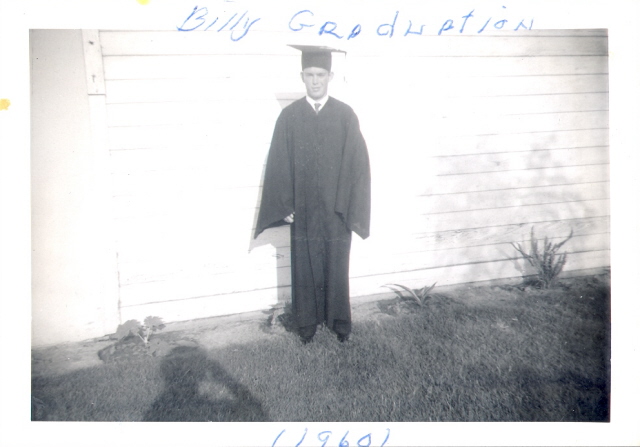TRANSCRIPTION
How old were you when the Vietnam War Started?
I guess about 20 years old, 1962.
What was your status, were you in school, working?
At the time, I was working.
What kind of work?
I was a
draftsman for Aero Jet General Corporation, in Azusa.
Why didn't you go to the war?
Well, I was drafted in 1961 I believe it was, and I went down there with my buddies and some of them went and they kept me home because I was missing my trigger finger and I was blind in one eye, and so they made me classification 4F.
What is
4F?
4F is just uh... I don't really know what it stands for it's just that you're not qualified to be in the service, due to handicaps.
How did you lose your finger?
Lost that looking for gold when I was 8 years old. My little buddy hit it with a sledge hammer and lost it.
 How did you lose your eye sight?
How did you lose your eye sight?
I lost that when I was 14 months old learning to walk. I fell and hit the corner of a night stand, or a coffee table I think it was.
How did the draft work?
Well when you turned 18 years old back in, back in those days and when you turned 18 years old you had to sign up for the draft before your 18th birthday, and then it would all go into a pool and that's what they would contact you from to be drafted.
How did you feel when you found out you couldn't go?
Hell I was kinda happy, I didn't really want to go, there were people dying. I was kinda lucky that I couldn't go.
Did you have friends who went?
Oh yeah, I had friends in high school that went, fortunately most of them all returned as far as I know.
Was life hard staying at home knowing you had friends over there?
Mmm... not really, I stayed home and took care of the home front while they fought
Did you keep in touch?
Just when they come home on leave, I'd go to 'em and see 'em.
What was the media like when reporting on the war?
It was different back then they didn't have the coverage that they have now. Like they couldn't go over there and shoot bombs and stuff like they're doing now while it was happening, but they kept us pretty up to date but you really never knew if it was true or not.
How did you find out what was going on during the war?
I had a brother in-law that was over there and some friends , when I'd see 'em when they'd come home and we talk, and the media that's about all you had to go by.
How did people here at home react to the war?
At first they were basically for it cause we were committed and just like we are now, but after a while everybody got tired and wanted everyone to come home. If it goes over a year nobody wants to be there anymore.
What was your opinion of the war?
I thought it was stupid and there was no need for it.
Why do you feel it was stupid?
It's just why were we there? Those people can... let 'em fight their own battles. We don't need to go every time somebody shoots each other.
Did people think it was wrong that you stayed home while the other men had to go?
No they knew the reasons behind it. Those were the rules that the United States Army made up and so I had no choice.
Do you wish you could have gone?
No not really, I felt bad about it a little bit for a while, but I got over it quick.
How has this experience influenced your life?
Mmm...I really don't think it had anything to affect on my life or the outcome of my life, not being involved in it or anything.
Is there anything you feel you need to add?
Not really, I don't believe so.

ANALYSIS
From doing this interview I learned that many people were against the Vietnam War. I also learned that my grandpa's brother had a disease which caused his brother to have one leg longer than the other and had to wear braces for 11 years (looks at scout's picture). Some of the most important points made in the interview were how the draft worked and why my grandfather was not allowed to go to the war. During this interview I learned that my grandfather had a brother-in-law who was in the Vietnam War. My grandfather expressed his feelings freely, never holding back his true opinion. I attempted to verify my grandfathers stories by asking my grandmother about it later on. The benefits of learning about the past this way is that it is so much more fun than reading a book, but the drawbacks are that history can change by word of mouth. I feel this is an excellent way to learn about our past, it's much more interesting than sitting through a lecture. My grandfather's son is now in the military and is currently in Iraq. During the interview my grandfather wore a shirt that said, "The war is not over until my son comes home".
ANNOTATED BIBLIOGRAPHY
The Handbook of Texas Online.
Copyright © The Texas State Historical Association.
The Handbook of Texas Online is a multidisciplinary encyclopedia of Texas history, geography,
and culture sponsored by the Texas State Historical Association and the General Libraries at
University of Texas at Austin. http://www.tsha.utexas.edu/handbook/online/ Last Updated: May 16, 2005.
Vietnam Historical Militaria.Copyright © 1999-2003 VnMilitaria.com All rights reserved.
This site contains all the terms and slang words used during the Vietnam War.
http://vnmilitaria.com/glossy.htm
Draftsman Gives a full description of the career and information on how to persue it.
http://www.obcweb.com/Career_Descriptions/Draftsman.htm Last Updated: March 26, 2000.
Return to Oral History Projects

